EA Games: Business Ethics, Stakeholders & Management Analysis
VerifiedAdded on 2023/01/09
|14
|4177
|68
Report
AI Summary
This report critically examines the business ethics and responsible management practices of Electronic Arts (EA) Games, focusing on the ethical issues surrounding loot boxes and their impact on stakeholders. It identifies the addictive nature of these in-game purchases and their potential to encourage gambling behavior, particularly among young gamers. The report evaluates EA's revenue generation model against the principles of business ethics and social responsibility, highlighting the adverse effects on gamers, their families, and society at large. It further contrasts EA's practices with ethical companies like Starbucks and unethical behaviors of companies like TESCO. Applying ethical theories such as Utilitarianism and Deontology, the analysis reveals conflicts between EA's actions and its moral duties to stakeholders. The report concludes with recommendations for EA to adopt more ethical revenue models, prioritize player well-being, and engage in community involvement to improve its ethical standing. Desklib provides access to similar solved assignments and study resources for students.
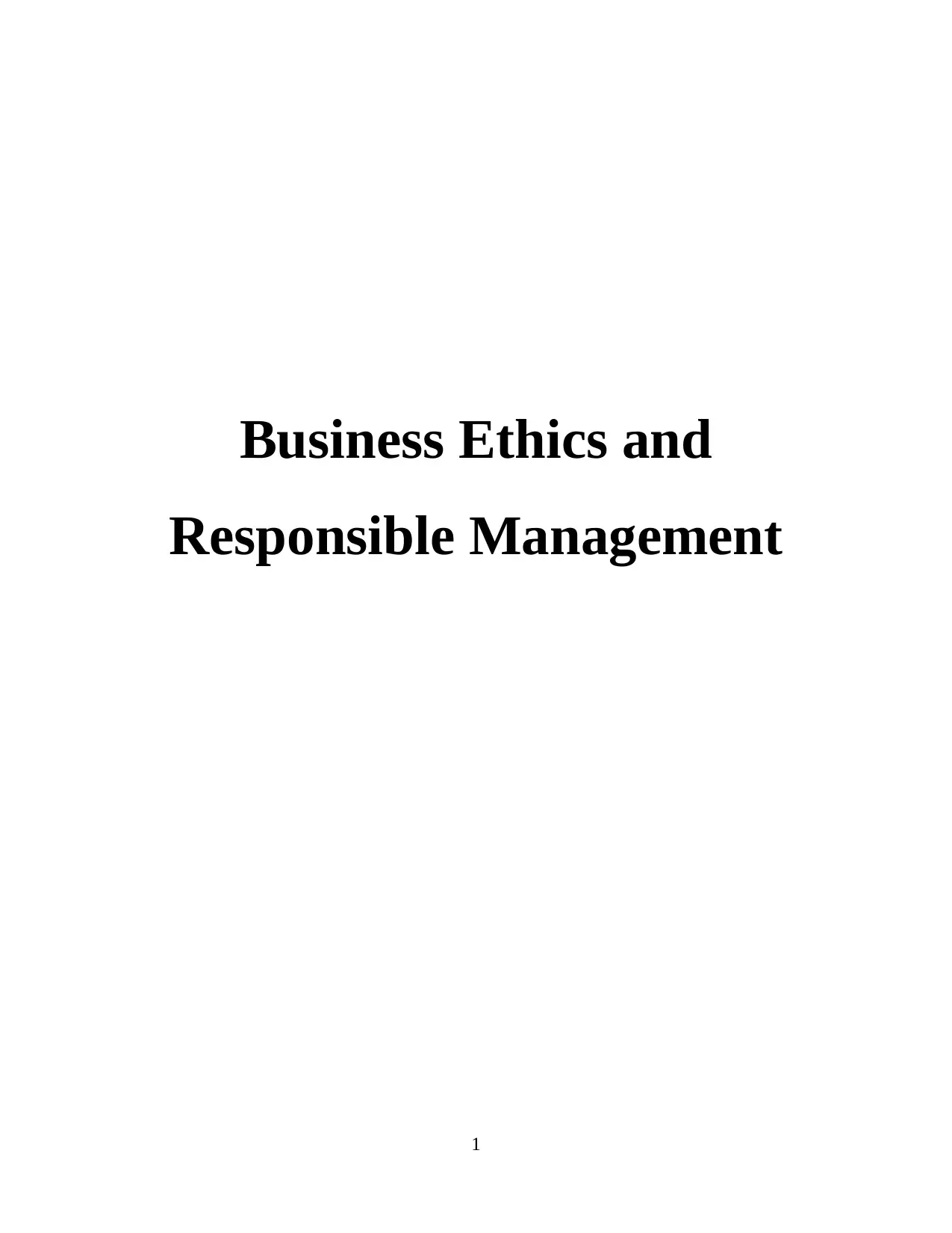
Business Ethics and
Responsible Management
1
Responsible Management
1
Paraphrase This Document
Need a fresh take? Get an instant paraphrase of this document with our AI Paraphraser
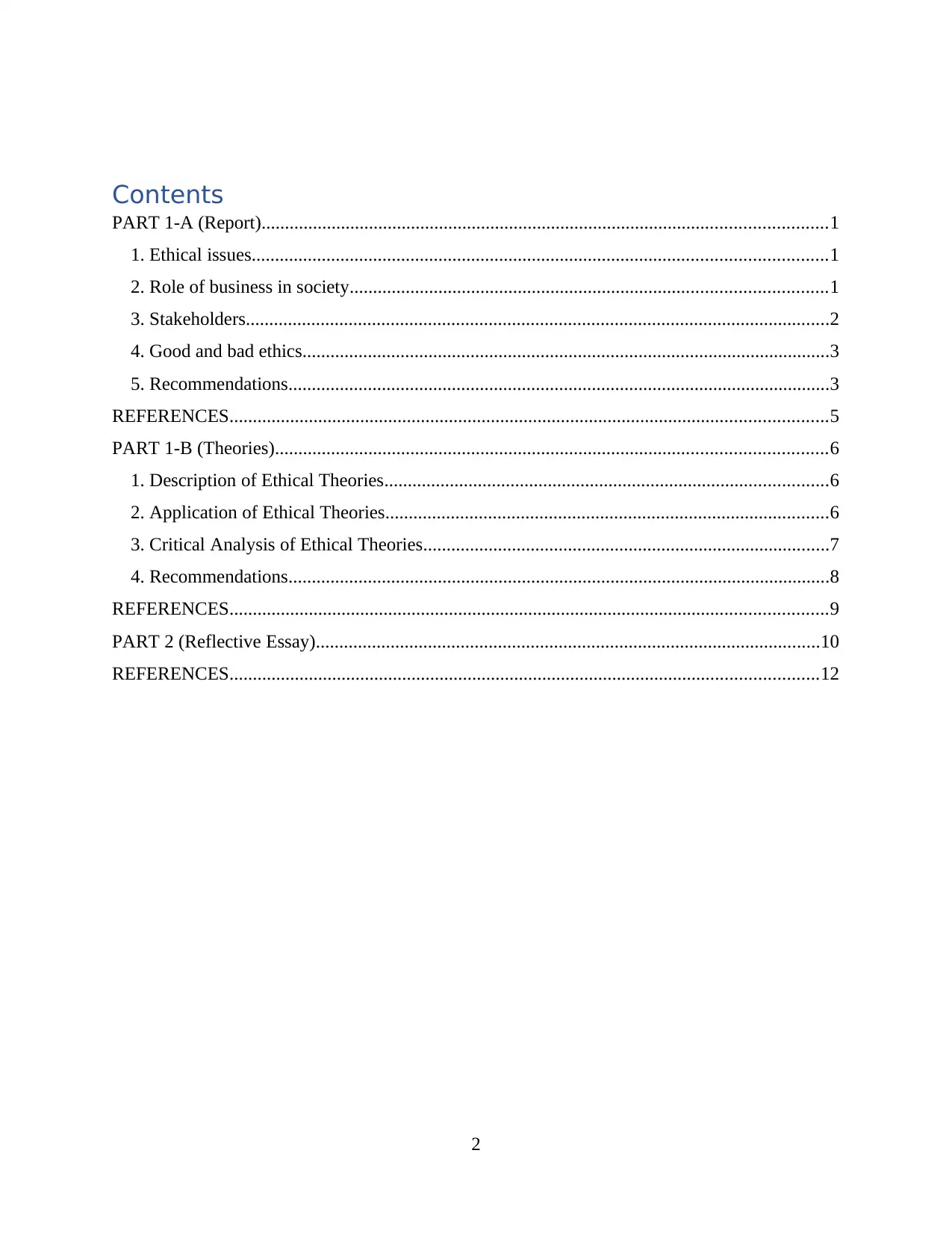
Contents
PART 1-A (Report).........................................................................................................................1
1. Ethical issues...........................................................................................................................1
2. Role of business in society......................................................................................................1
3. Stakeholders.............................................................................................................................2
4. Good and bad ethics.................................................................................................................3
5. Recommendations....................................................................................................................3
REFERENCES................................................................................................................................5
PART 1-B (Theories)......................................................................................................................6
1. Description of Ethical Theories...............................................................................................6
2. Application of Ethical Theories...............................................................................................6
3. Critical Analysis of Ethical Theories.......................................................................................7
4. Recommendations....................................................................................................................8
REFERENCES................................................................................................................................9
PART 2 (Reflective Essay)............................................................................................................10
REFERENCES..............................................................................................................................12
2
PART 1-A (Report).........................................................................................................................1
1. Ethical issues...........................................................................................................................1
2. Role of business in society......................................................................................................1
3. Stakeholders.............................................................................................................................2
4. Good and bad ethics.................................................................................................................3
5. Recommendations....................................................................................................................3
REFERENCES................................................................................................................................5
PART 1-B (Theories)......................................................................................................................6
1. Description of Ethical Theories...............................................................................................6
2. Application of Ethical Theories...............................................................................................6
3. Critical Analysis of Ethical Theories.......................................................................................7
4. Recommendations....................................................................................................................8
REFERENCES................................................................................................................................9
PART 2 (Reflective Essay)............................................................................................................10
REFERENCES..............................................................................................................................12
2
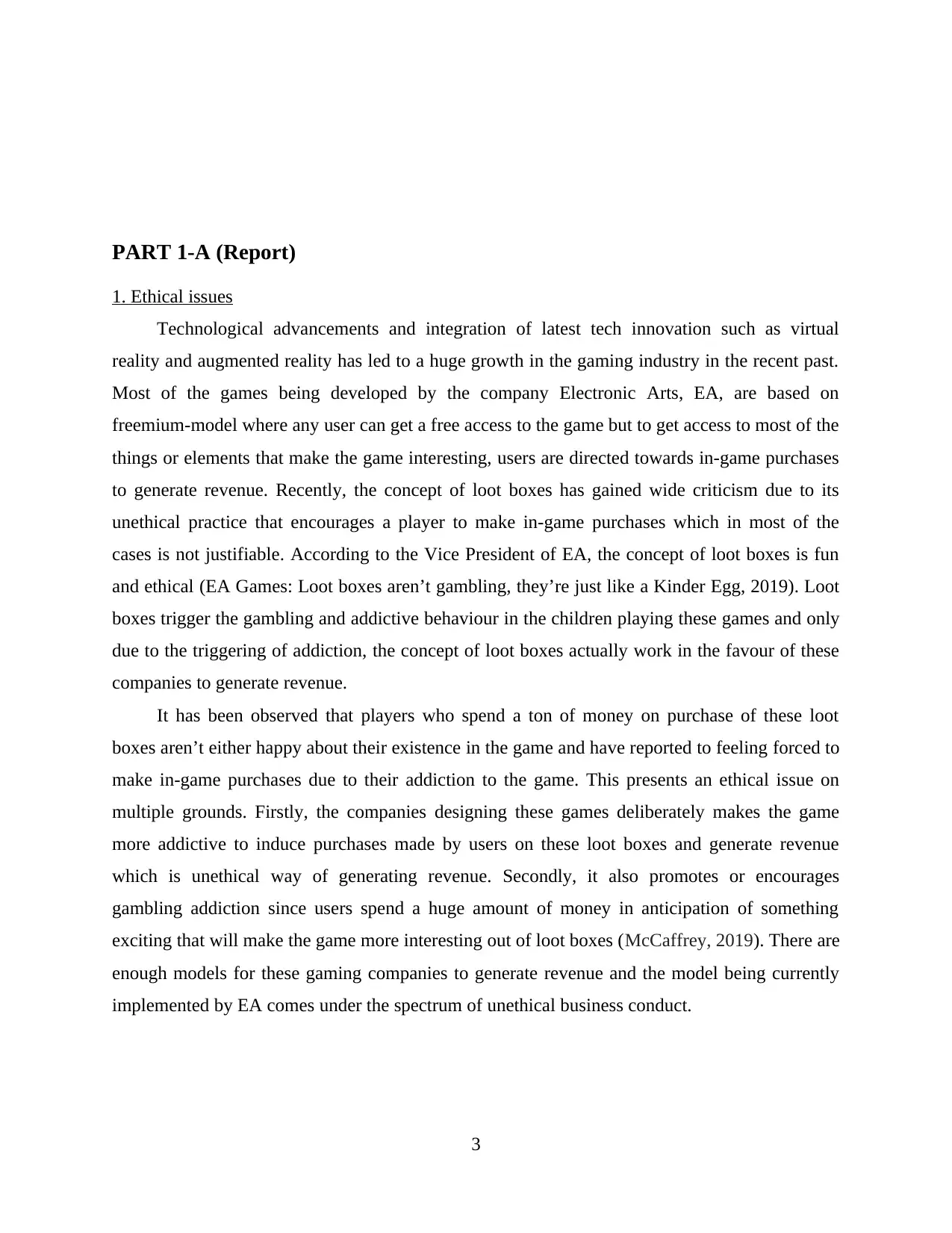
PART 1-A (Report)
1. Ethical issues
Technological advancements and integration of latest tech innovation such as virtual
reality and augmented reality has led to a huge growth in the gaming industry in the recent past.
Most of the games being developed by the company Electronic Arts, EA, are based on
freemium-model where any user can get a free access to the game but to get access to most of the
things or elements that make the game interesting, users are directed towards in-game purchases
to generate revenue. Recently, the concept of loot boxes has gained wide criticism due to its
unethical practice that encourages a player to make in-game purchases which in most of the
cases is not justifiable. According to the Vice President of EA, the concept of loot boxes is fun
and ethical (EA Games: Loot boxes aren’t gambling, they’re just like a Kinder Egg, 2019). Loot
boxes trigger the gambling and addictive behaviour in the children playing these games and only
due to the triggering of addiction, the concept of loot boxes actually work in the favour of these
companies to generate revenue.
It has been observed that players who spend a ton of money on purchase of these loot
boxes aren’t either happy about their existence in the game and have reported to feeling forced to
make in-game purchases due to their addiction to the game. This presents an ethical issue on
multiple grounds. Firstly, the companies designing these games deliberately makes the game
more addictive to induce purchases made by users on these loot boxes and generate revenue
which is unethical way of generating revenue. Secondly, it also promotes or encourages
gambling addiction since users spend a huge amount of money in anticipation of something
exciting that will make the game more interesting out of loot boxes (McCaffrey, 2019). There are
enough models for these gaming companies to generate revenue and the model being currently
implemented by EA comes under the spectrum of unethical business conduct.
3
1. Ethical issues
Technological advancements and integration of latest tech innovation such as virtual
reality and augmented reality has led to a huge growth in the gaming industry in the recent past.
Most of the games being developed by the company Electronic Arts, EA, are based on
freemium-model where any user can get a free access to the game but to get access to most of the
things or elements that make the game interesting, users are directed towards in-game purchases
to generate revenue. Recently, the concept of loot boxes has gained wide criticism due to its
unethical practice that encourages a player to make in-game purchases which in most of the
cases is not justifiable. According to the Vice President of EA, the concept of loot boxes is fun
and ethical (EA Games: Loot boxes aren’t gambling, they’re just like a Kinder Egg, 2019). Loot
boxes trigger the gambling and addictive behaviour in the children playing these games and only
due to the triggering of addiction, the concept of loot boxes actually work in the favour of these
companies to generate revenue.
It has been observed that players who spend a ton of money on purchase of these loot
boxes aren’t either happy about their existence in the game and have reported to feeling forced to
make in-game purchases due to their addiction to the game. This presents an ethical issue on
multiple grounds. Firstly, the companies designing these games deliberately makes the game
more addictive to induce purchases made by users on these loot boxes and generate revenue
which is unethical way of generating revenue. Secondly, it also promotes or encourages
gambling addiction since users spend a huge amount of money in anticipation of something
exciting that will make the game more interesting out of loot boxes (McCaffrey, 2019). There are
enough models for these gaming companies to generate revenue and the model being currently
implemented by EA comes under the spectrum of unethical business conduct.
3
⊘ This is a preview!⊘
Do you want full access?
Subscribe today to unlock all pages.

Trusted by 1+ million students worldwide
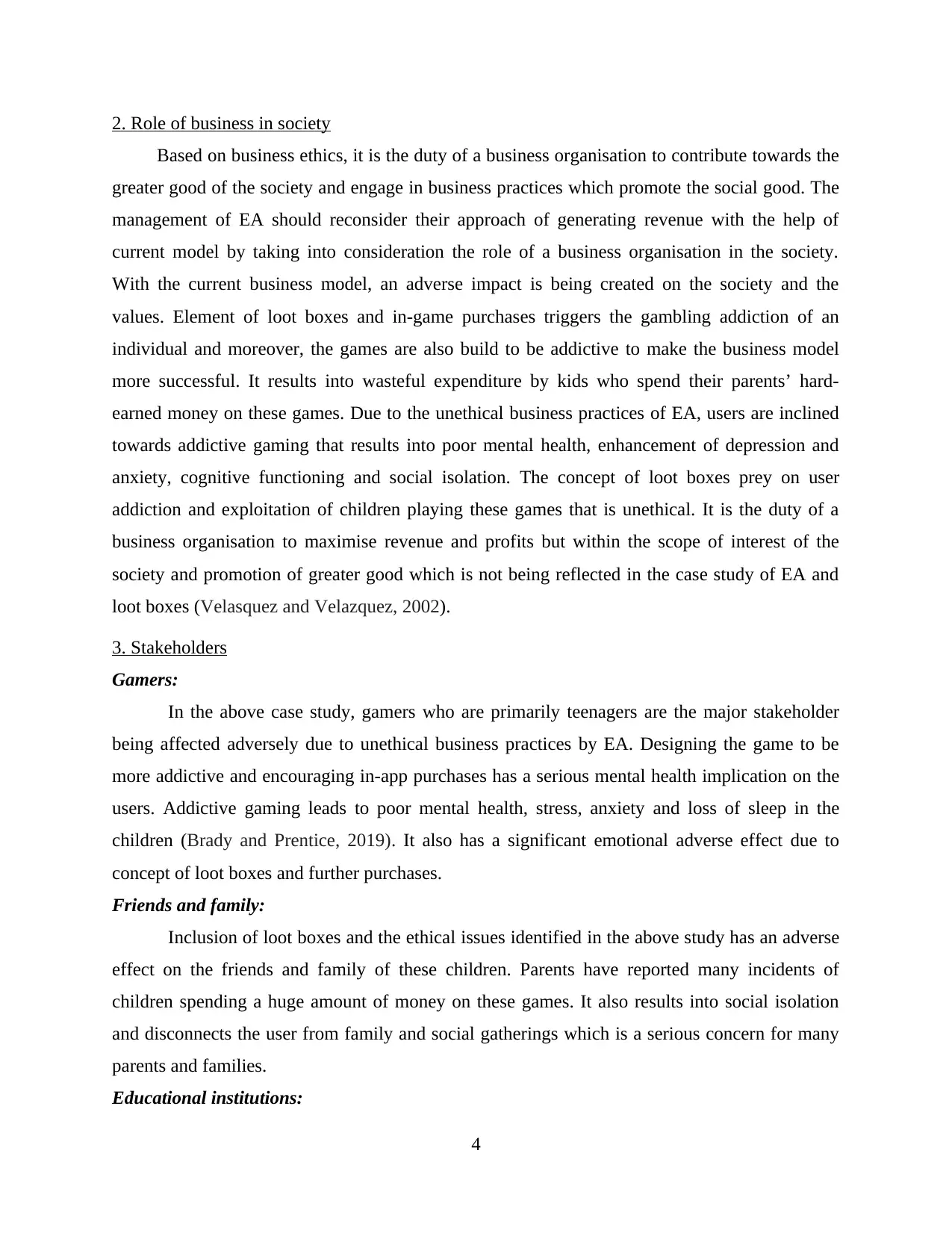
2. Role of business in society
Based on business ethics, it is the duty of a business organisation to contribute towards the
greater good of the society and engage in business practices which promote the social good. The
management of EA should reconsider their approach of generating revenue with the help of
current model by taking into consideration the role of a business organisation in the society.
With the current business model, an adverse impact is being created on the society and the
values. Element of loot boxes and in-game purchases triggers the gambling addiction of an
individual and moreover, the games are also build to be addictive to make the business model
more successful. It results into wasteful expenditure by kids who spend their parents’ hard-
earned money on these games. Due to the unethical business practices of EA, users are inclined
towards addictive gaming that results into poor mental health, enhancement of depression and
anxiety, cognitive functioning and social isolation. The concept of loot boxes prey on user
addiction and exploitation of children playing these games that is unethical. It is the duty of a
business organisation to maximise revenue and profits but within the scope of interest of the
society and promotion of greater good which is not being reflected in the case study of EA and
loot boxes (Velasquez and Velazquez, 2002).
3. Stakeholders
Gamers:
In the above case study, gamers who are primarily teenagers are the major stakeholder
being affected adversely due to unethical business practices by EA. Designing the game to be
more addictive and encouraging in-app purchases has a serious mental health implication on the
users. Addictive gaming leads to poor mental health, stress, anxiety and loss of sleep in the
children (Brady and Prentice, 2019). It also has a significant emotional adverse effect due to
concept of loot boxes and further purchases.
Friends and family:
Inclusion of loot boxes and the ethical issues identified in the above study has an adverse
effect on the friends and family of these children. Parents have reported many incidents of
children spending a huge amount of money on these games. It also results into social isolation
and disconnects the user from family and social gatherings which is a serious concern for many
parents and families.
Educational institutions:
4
Based on business ethics, it is the duty of a business organisation to contribute towards the
greater good of the society and engage in business practices which promote the social good. The
management of EA should reconsider their approach of generating revenue with the help of
current model by taking into consideration the role of a business organisation in the society.
With the current business model, an adverse impact is being created on the society and the
values. Element of loot boxes and in-game purchases triggers the gambling addiction of an
individual and moreover, the games are also build to be addictive to make the business model
more successful. It results into wasteful expenditure by kids who spend their parents’ hard-
earned money on these games. Due to the unethical business practices of EA, users are inclined
towards addictive gaming that results into poor mental health, enhancement of depression and
anxiety, cognitive functioning and social isolation. The concept of loot boxes prey on user
addiction and exploitation of children playing these games that is unethical. It is the duty of a
business organisation to maximise revenue and profits but within the scope of interest of the
society and promotion of greater good which is not being reflected in the case study of EA and
loot boxes (Velasquez and Velazquez, 2002).
3. Stakeholders
Gamers:
In the above case study, gamers who are primarily teenagers are the major stakeholder
being affected adversely due to unethical business practices by EA. Designing the game to be
more addictive and encouraging in-app purchases has a serious mental health implication on the
users. Addictive gaming leads to poor mental health, stress, anxiety and loss of sleep in the
children (Brady and Prentice, 2019). It also has a significant emotional adverse effect due to
concept of loot boxes and further purchases.
Friends and family:
Inclusion of loot boxes and the ethical issues identified in the above study has an adverse
effect on the friends and family of these children. Parents have reported many incidents of
children spending a huge amount of money on these games. It also results into social isolation
and disconnects the user from family and social gatherings which is a serious concern for many
parents and families.
Educational institutions:
4
Paraphrase This Document
Need a fresh take? Get an instant paraphrase of this document with our AI Paraphraser
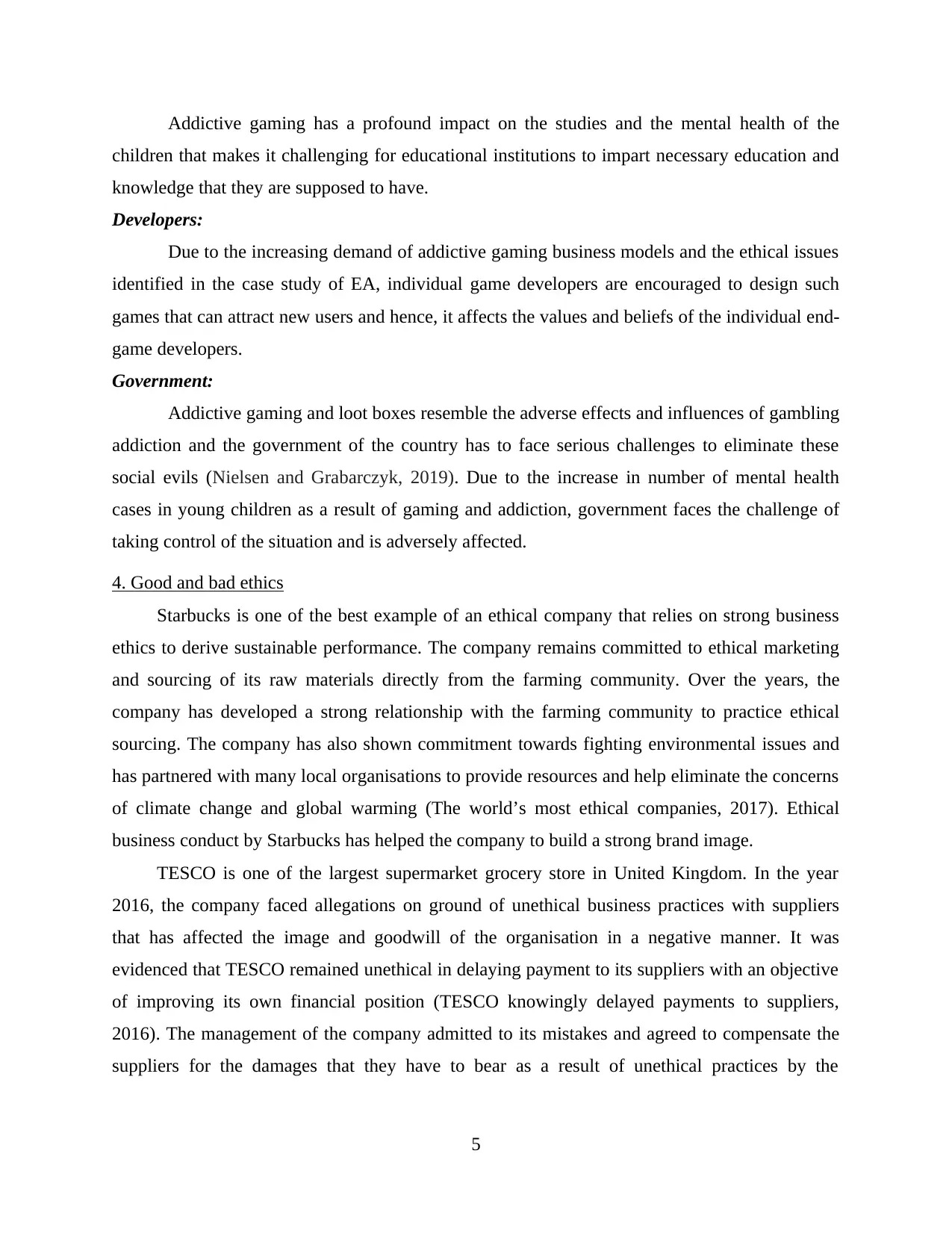
Addictive gaming has a profound impact on the studies and the mental health of the
children that makes it challenging for educational institutions to impart necessary education and
knowledge that they are supposed to have.
Developers:
Due to the increasing demand of addictive gaming business models and the ethical issues
identified in the case study of EA, individual game developers are encouraged to design such
games that can attract new users and hence, it affects the values and beliefs of the individual end-
game developers.
Government:
Addictive gaming and loot boxes resemble the adverse effects and influences of gambling
addiction and the government of the country has to face serious challenges to eliminate these
social evils (Nielsen and Grabarczyk, 2019). Due to the increase in number of mental health
cases in young children as a result of gaming and addiction, government faces the challenge of
taking control of the situation and is adversely affected.
4. Good and bad ethics
Starbucks is one of the best example of an ethical company that relies on strong business
ethics to derive sustainable performance. The company remains committed to ethical marketing
and sourcing of its raw materials directly from the farming community. Over the years, the
company has developed a strong relationship with the farming community to practice ethical
sourcing. The company has also shown commitment towards fighting environmental issues and
has partnered with many local organisations to provide resources and help eliminate the concerns
of climate change and global warming (The world’s most ethical companies, 2017). Ethical
business conduct by Starbucks has helped the company to build a strong brand image.
TESCO is one of the largest supermarket grocery store in United Kingdom. In the year
2016, the company faced allegations on ground of unethical business practices with suppliers
that has affected the image and goodwill of the organisation in a negative manner. It was
evidenced that TESCO remained unethical in delaying payment to its suppliers with an objective
of improving its own financial position (TESCO knowingly delayed payments to suppliers,
2016). The management of the company admitted to its mistakes and agreed to compensate the
suppliers for the damages that they have to bear as a result of unethical practices by the
5
children that makes it challenging for educational institutions to impart necessary education and
knowledge that they are supposed to have.
Developers:
Due to the increasing demand of addictive gaming business models and the ethical issues
identified in the case study of EA, individual game developers are encouraged to design such
games that can attract new users and hence, it affects the values and beliefs of the individual end-
game developers.
Government:
Addictive gaming and loot boxes resemble the adverse effects and influences of gambling
addiction and the government of the country has to face serious challenges to eliminate these
social evils (Nielsen and Grabarczyk, 2019). Due to the increase in number of mental health
cases in young children as a result of gaming and addiction, government faces the challenge of
taking control of the situation and is adversely affected.
4. Good and bad ethics
Starbucks is one of the best example of an ethical company that relies on strong business
ethics to derive sustainable performance. The company remains committed to ethical marketing
and sourcing of its raw materials directly from the farming community. Over the years, the
company has developed a strong relationship with the farming community to practice ethical
sourcing. The company has also shown commitment towards fighting environmental issues and
has partnered with many local organisations to provide resources and help eliminate the concerns
of climate change and global warming (The world’s most ethical companies, 2017). Ethical
business conduct by Starbucks has helped the company to build a strong brand image.
TESCO is one of the largest supermarket grocery store in United Kingdom. In the year
2016, the company faced allegations on ground of unethical business practices with suppliers
that has affected the image and goodwill of the organisation in a negative manner. It was
evidenced that TESCO remained unethical in delaying payment to its suppliers with an objective
of improving its own financial position (TESCO knowingly delayed payments to suppliers,
2016). The management of the company admitted to its mistakes and agreed to compensate the
suppliers for the damages that they have to bear as a result of unethical practices by the
5
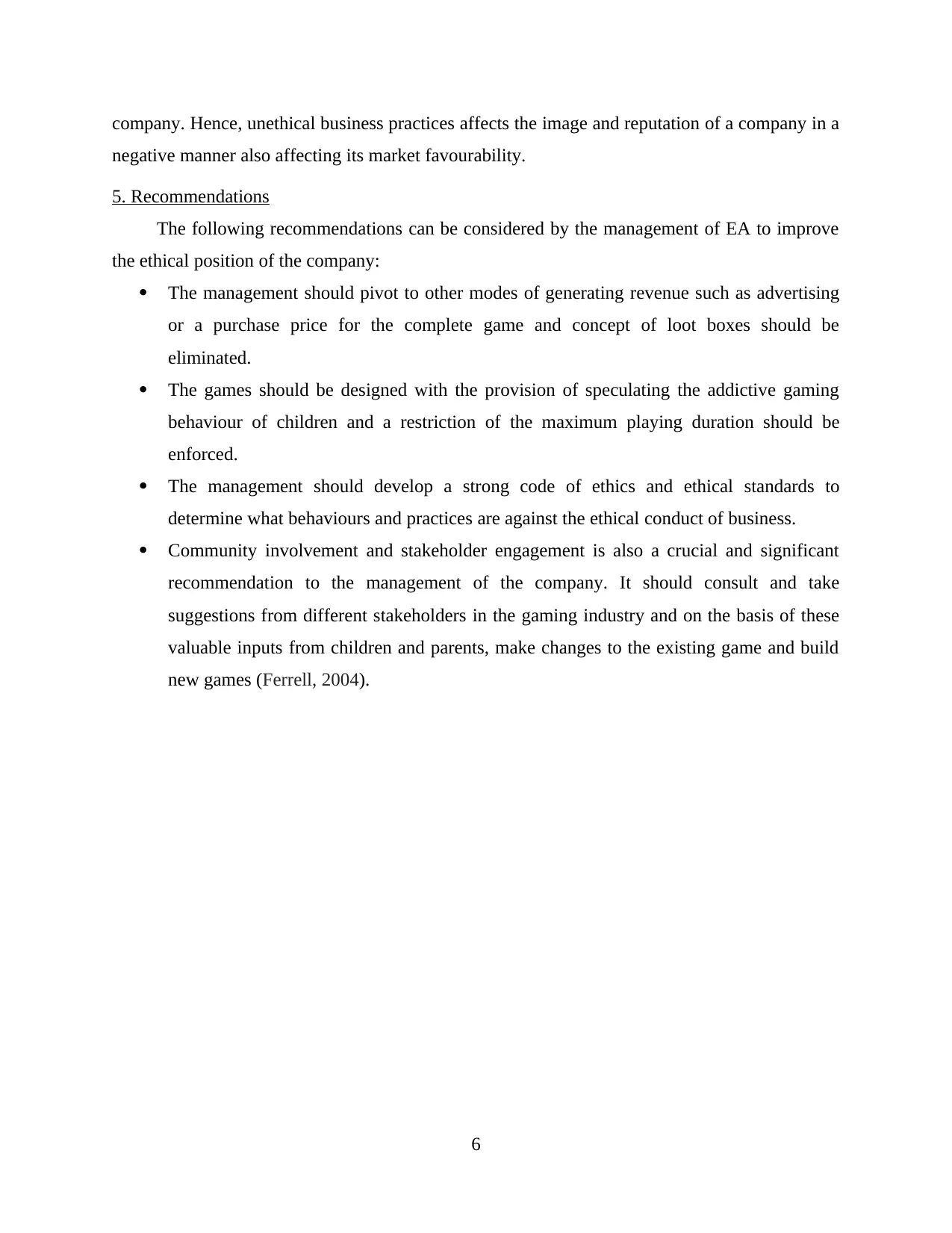
company. Hence, unethical business practices affects the image and reputation of a company in a
negative manner also affecting its market favourability.
5. Recommendations
The following recommendations can be considered by the management of EA to improve
the ethical position of the company:
The management should pivot to other modes of generating revenue such as advertising
or a purchase price for the complete game and concept of loot boxes should be
eliminated.
The games should be designed with the provision of speculating the addictive gaming
behaviour of children and a restriction of the maximum playing duration should be
enforced.
The management should develop a strong code of ethics and ethical standards to
determine what behaviours and practices are against the ethical conduct of business.
Community involvement and stakeholder engagement is also a crucial and significant
recommendation to the management of the company. It should consult and take
suggestions from different stakeholders in the gaming industry and on the basis of these
valuable inputs from children and parents, make changes to the existing game and build
new games (Ferrell, 2004).
6
negative manner also affecting its market favourability.
5. Recommendations
The following recommendations can be considered by the management of EA to improve
the ethical position of the company:
The management should pivot to other modes of generating revenue such as advertising
or a purchase price for the complete game and concept of loot boxes should be
eliminated.
The games should be designed with the provision of speculating the addictive gaming
behaviour of children and a restriction of the maximum playing duration should be
enforced.
The management should develop a strong code of ethics and ethical standards to
determine what behaviours and practices are against the ethical conduct of business.
Community involvement and stakeholder engagement is also a crucial and significant
recommendation to the management of the company. It should consult and take
suggestions from different stakeholders in the gaming industry and on the basis of these
valuable inputs from children and parents, make changes to the existing game and build
new games (Ferrell, 2004).
6
⊘ This is a preview!⊘
Do you want full access?
Subscribe today to unlock all pages.

Trusted by 1+ million students worldwide
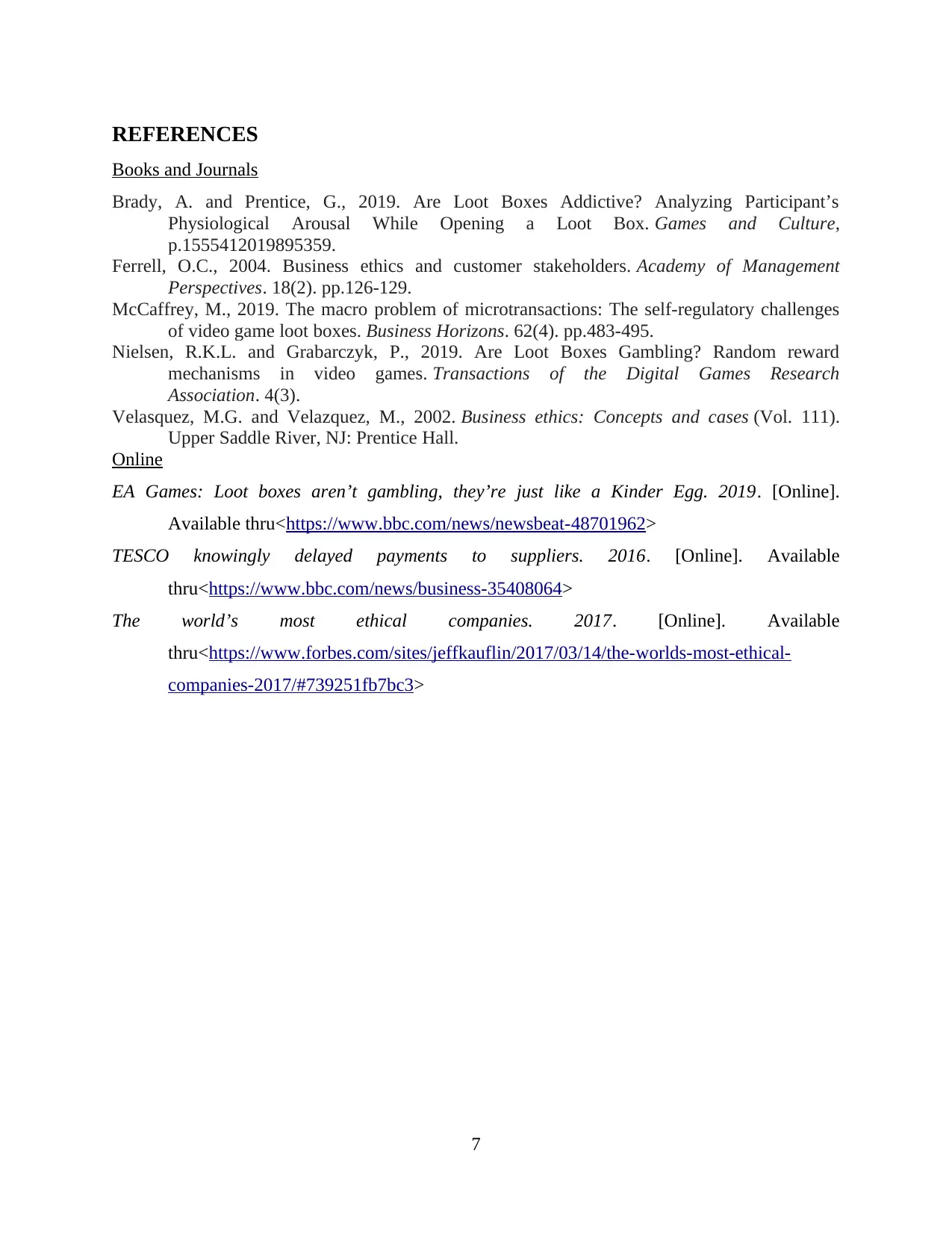
REFERENCES
Books and Journals
Brady, A. and Prentice, G., 2019. Are Loot Boxes Addictive? Analyzing Participant’s
Physiological Arousal While Opening a Loot Box. Games and Culture,
p.1555412019895359.
Ferrell, O.C., 2004. Business ethics and customer stakeholders. Academy of Management
Perspectives. 18(2). pp.126-129.
McCaffrey, M., 2019. The macro problem of microtransactions: The self-regulatory challenges
of video game loot boxes. Business Horizons. 62(4). pp.483-495.
Nielsen, R.K.L. and Grabarczyk, P., 2019. Are Loot Boxes Gambling? Random reward
mechanisms in video games. Transactions of the Digital Games Research
Association. 4(3).
Velasquez, M.G. and Velazquez, M., 2002. Business ethics: Concepts and cases (Vol. 111).
Upper Saddle River, NJ: Prentice Hall.
Online
EA Games: Loot boxes aren’t gambling, they’re just like a Kinder Egg. 2019. [Online].
Available thru<https://www.bbc.com/news/newsbeat-48701962>
TESCO knowingly delayed payments to suppliers. 2016. [Online]. Available
thru<https://www.bbc.com/news/business-35408064>
The world’s most ethical companies. 2017. [Online]. Available
thru<https://www.forbes.com/sites/jeffkauflin/2017/03/14/the-worlds-most-ethical-
companies-2017/#739251fb7bc3>
7
Books and Journals
Brady, A. and Prentice, G., 2019. Are Loot Boxes Addictive? Analyzing Participant’s
Physiological Arousal While Opening a Loot Box. Games and Culture,
p.1555412019895359.
Ferrell, O.C., 2004. Business ethics and customer stakeholders. Academy of Management
Perspectives. 18(2). pp.126-129.
McCaffrey, M., 2019. The macro problem of microtransactions: The self-regulatory challenges
of video game loot boxes. Business Horizons. 62(4). pp.483-495.
Nielsen, R.K.L. and Grabarczyk, P., 2019. Are Loot Boxes Gambling? Random reward
mechanisms in video games. Transactions of the Digital Games Research
Association. 4(3).
Velasquez, M.G. and Velazquez, M., 2002. Business ethics: Concepts and cases (Vol. 111).
Upper Saddle River, NJ: Prentice Hall.
Online
EA Games: Loot boxes aren’t gambling, they’re just like a Kinder Egg. 2019. [Online].
Available thru<https://www.bbc.com/news/newsbeat-48701962>
TESCO knowingly delayed payments to suppliers. 2016. [Online]. Available
thru<https://www.bbc.com/news/business-35408064>
The world’s most ethical companies. 2017. [Online]. Available
thru<https://www.forbes.com/sites/jeffkauflin/2017/03/14/the-worlds-most-ethical-
companies-2017/#739251fb7bc3>
7
Paraphrase This Document
Need a fresh take? Get an instant paraphrase of this document with our AI Paraphraser
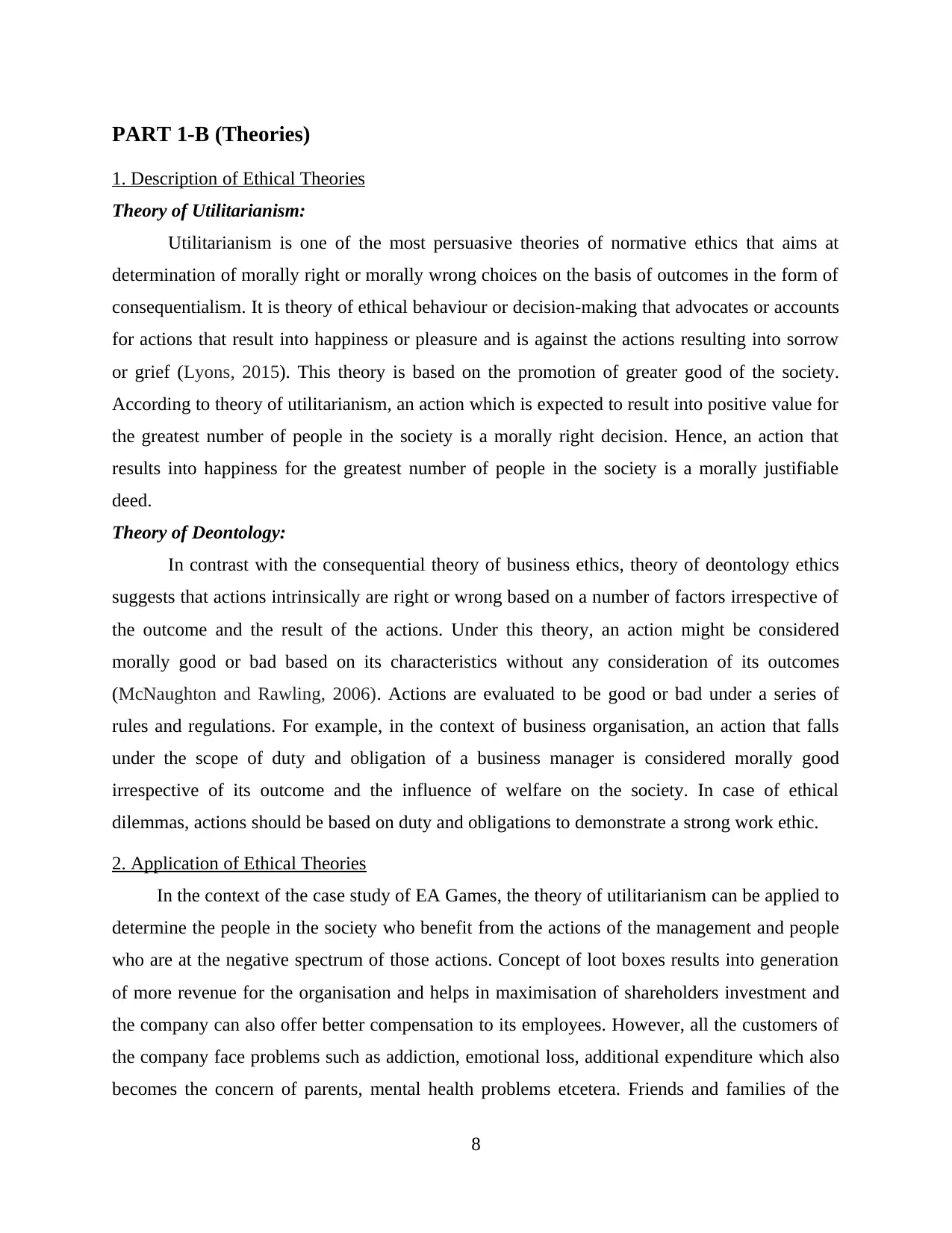
PART 1-B (Theories)
1. Description of Ethical Theories
Theory of Utilitarianism:
Utilitarianism is one of the most persuasive theories of normative ethics that aims at
determination of morally right or morally wrong choices on the basis of outcomes in the form of
consequentialism. It is theory of ethical behaviour or decision-making that advocates or accounts
for actions that result into happiness or pleasure and is against the actions resulting into sorrow
or grief (Lyons, 2015). This theory is based on the promotion of greater good of the society.
According to theory of utilitarianism, an action which is expected to result into positive value for
the greatest number of people in the society is a morally right decision. Hence, an action that
results into happiness for the greatest number of people in the society is a morally justifiable
deed.
Theory of Deontology:
In contrast with the consequential theory of business ethics, theory of deontology ethics
suggests that actions intrinsically are right or wrong based on a number of factors irrespective of
the outcome and the result of the actions. Under this theory, an action might be considered
morally good or bad based on its characteristics without any consideration of its outcomes
(McNaughton and Rawling, 2006). Actions are evaluated to be good or bad under a series of
rules and regulations. For example, in the context of business organisation, an action that falls
under the scope of duty and obligation of a business manager is considered morally good
irrespective of its outcome and the influence of welfare on the society. In case of ethical
dilemmas, actions should be based on duty and obligations to demonstrate a strong work ethic.
2. Application of Ethical Theories
In the context of the case study of EA Games, the theory of utilitarianism can be applied to
determine the people in the society who benefit from the actions of the management and people
who are at the negative spectrum of those actions. Concept of loot boxes results into generation
of more revenue for the organisation and helps in maximisation of shareholders investment and
the company can also offer better compensation to its employees. However, all the customers of
the company face problems such as addiction, emotional loss, additional expenditure which also
becomes the concern of parents, mental health problems etcetera. Friends and families of the
8
1. Description of Ethical Theories
Theory of Utilitarianism:
Utilitarianism is one of the most persuasive theories of normative ethics that aims at
determination of morally right or morally wrong choices on the basis of outcomes in the form of
consequentialism. It is theory of ethical behaviour or decision-making that advocates or accounts
for actions that result into happiness or pleasure and is against the actions resulting into sorrow
or grief (Lyons, 2015). This theory is based on the promotion of greater good of the society.
According to theory of utilitarianism, an action which is expected to result into positive value for
the greatest number of people in the society is a morally right decision. Hence, an action that
results into happiness for the greatest number of people in the society is a morally justifiable
deed.
Theory of Deontology:
In contrast with the consequential theory of business ethics, theory of deontology ethics
suggests that actions intrinsically are right or wrong based on a number of factors irrespective of
the outcome and the result of the actions. Under this theory, an action might be considered
morally good or bad based on its characteristics without any consideration of its outcomes
(McNaughton and Rawling, 2006). Actions are evaluated to be good or bad under a series of
rules and regulations. For example, in the context of business organisation, an action that falls
under the scope of duty and obligation of a business manager is considered morally good
irrespective of its outcome and the influence of welfare on the society. In case of ethical
dilemmas, actions should be based on duty and obligations to demonstrate a strong work ethic.
2. Application of Ethical Theories
In the context of the case study of EA Games, the theory of utilitarianism can be applied to
determine the people in the society who benefit from the actions of the management and people
who are at the negative spectrum of those actions. Concept of loot boxes results into generation
of more revenue for the organisation and helps in maximisation of shareholders investment and
the company can also offer better compensation to its employees. However, all the customers of
the company face problems such as addiction, emotional loss, additional expenditure which also
becomes the concern of parents, mental health problems etcetera. Friends and families of the
8
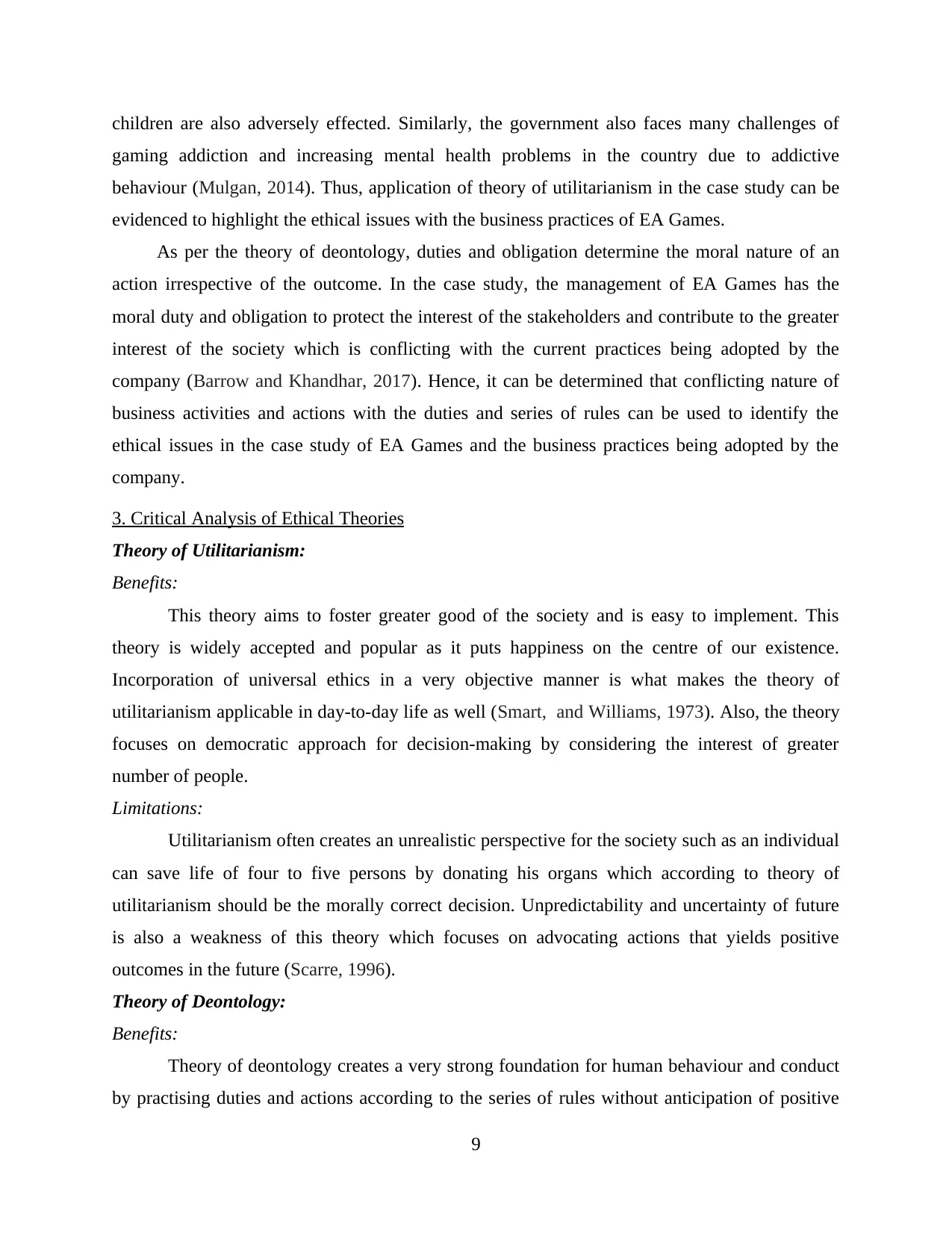
children are also adversely effected. Similarly, the government also faces many challenges of
gaming addiction and increasing mental health problems in the country due to addictive
behaviour (Mulgan, 2014). Thus, application of theory of utilitarianism in the case study can be
evidenced to highlight the ethical issues with the business practices of EA Games.
As per the theory of deontology, duties and obligation determine the moral nature of an
action irrespective of the outcome. In the case study, the management of EA Games has the
moral duty and obligation to protect the interest of the stakeholders and contribute to the greater
interest of the society which is conflicting with the current practices being adopted by the
company (Barrow and Khandhar, 2017). Hence, it can be determined that conflicting nature of
business activities and actions with the duties and series of rules can be used to identify the
ethical issues in the case study of EA Games and the business practices being adopted by the
company.
3. Critical Analysis of Ethical Theories
Theory of Utilitarianism:
Benefits:
This theory aims to foster greater good of the society and is easy to implement. This
theory is widely accepted and popular as it puts happiness on the centre of our existence.
Incorporation of universal ethics in a very objective manner is what makes the theory of
utilitarianism applicable in day-to-day life as well (Smart, and Williams, 1973). Also, the theory
focuses on democratic approach for decision-making by considering the interest of greater
number of people.
Limitations:
Utilitarianism often creates an unrealistic perspective for the society such as an individual
can save life of four to five persons by donating his organs which according to theory of
utilitarianism should be the morally correct decision. Unpredictability and uncertainty of future
is also a weakness of this theory which focuses on advocating actions that yields positive
outcomes in the future (Scarre, 1996).
Theory of Deontology:
Benefits:
Theory of deontology creates a very strong foundation for human behaviour and conduct
by practising duties and actions according to the series of rules without anticipation of positive
9
gaming addiction and increasing mental health problems in the country due to addictive
behaviour (Mulgan, 2014). Thus, application of theory of utilitarianism in the case study can be
evidenced to highlight the ethical issues with the business practices of EA Games.
As per the theory of deontology, duties and obligation determine the moral nature of an
action irrespective of the outcome. In the case study, the management of EA Games has the
moral duty and obligation to protect the interest of the stakeholders and contribute to the greater
interest of the society which is conflicting with the current practices being adopted by the
company (Barrow and Khandhar, 2017). Hence, it can be determined that conflicting nature of
business activities and actions with the duties and series of rules can be used to identify the
ethical issues in the case study of EA Games and the business practices being adopted by the
company.
3. Critical Analysis of Ethical Theories
Theory of Utilitarianism:
Benefits:
This theory aims to foster greater good of the society and is easy to implement. This
theory is widely accepted and popular as it puts happiness on the centre of our existence.
Incorporation of universal ethics in a very objective manner is what makes the theory of
utilitarianism applicable in day-to-day life as well (Smart, and Williams, 1973). Also, the theory
focuses on democratic approach for decision-making by considering the interest of greater
number of people.
Limitations:
Utilitarianism often creates an unrealistic perspective for the society such as an individual
can save life of four to five persons by donating his organs which according to theory of
utilitarianism should be the morally correct decision. Unpredictability and uncertainty of future
is also a weakness of this theory which focuses on advocating actions that yields positive
outcomes in the future (Scarre, 1996).
Theory of Deontology:
Benefits:
Theory of deontology creates a very strong foundation for human behaviour and conduct
by practising duties and actions according to the series of rules without anticipation of positive
9
⊘ This is a preview!⊘
Do you want full access?
Subscribe today to unlock all pages.

Trusted by 1+ million students worldwide
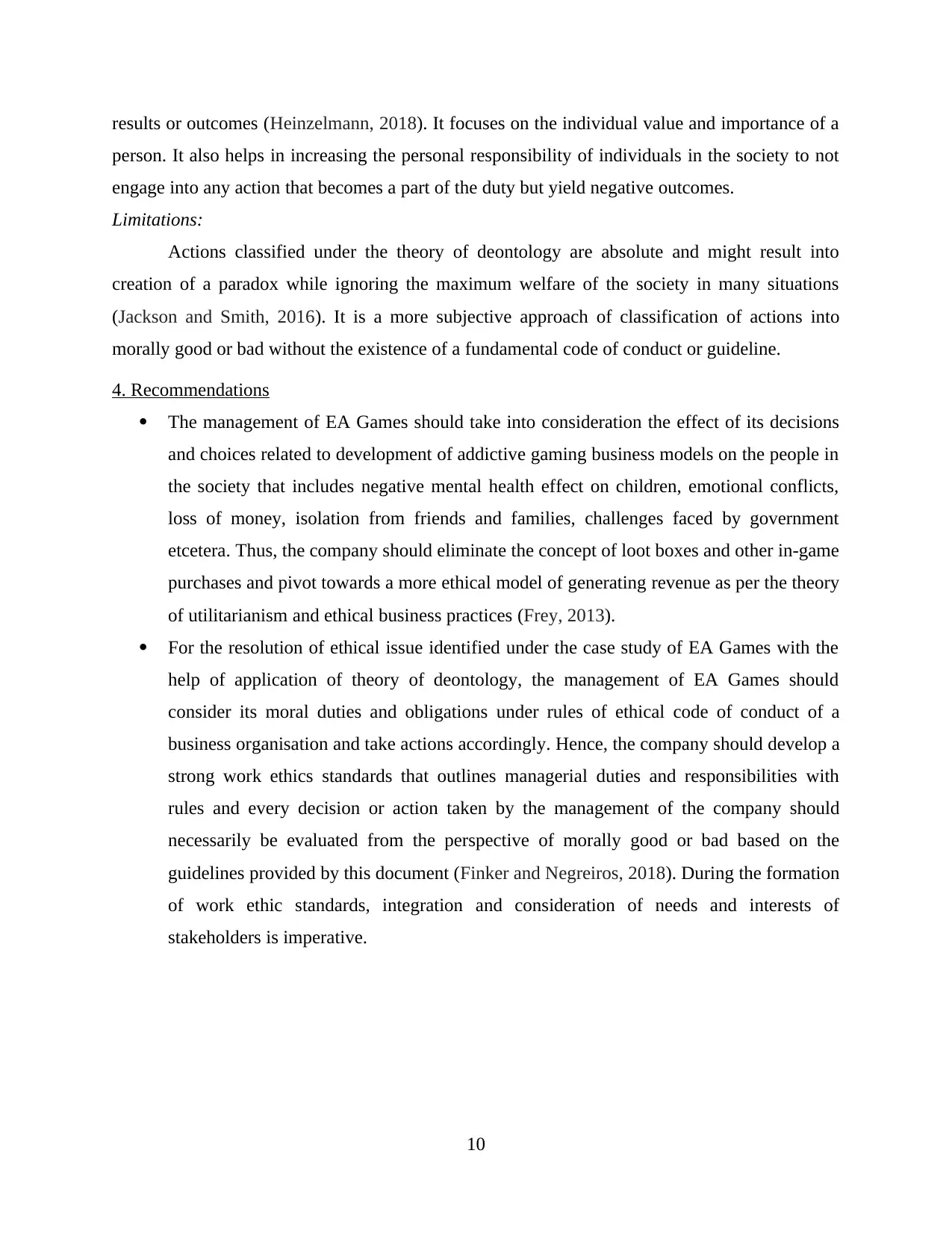
results or outcomes (Heinzelmann, 2018). It focuses on the individual value and importance of a
person. It also helps in increasing the personal responsibility of individuals in the society to not
engage into any action that becomes a part of the duty but yield negative outcomes.
Limitations:
Actions classified under the theory of deontology are absolute and might result into
creation of a paradox while ignoring the maximum welfare of the society in many situations
(Jackson and Smith, 2016). It is a more subjective approach of classification of actions into
morally good or bad without the existence of a fundamental code of conduct or guideline.
4. Recommendations
The management of EA Games should take into consideration the effect of its decisions
and choices related to development of addictive gaming business models on the people in
the society that includes negative mental health effect on children, emotional conflicts,
loss of money, isolation from friends and families, challenges faced by government
etcetera. Thus, the company should eliminate the concept of loot boxes and other in-game
purchases and pivot towards a more ethical model of generating revenue as per the theory
of utilitarianism and ethical business practices (Frey, 2013).
For the resolution of ethical issue identified under the case study of EA Games with the
help of application of theory of deontology, the management of EA Games should
consider its moral duties and obligations under rules of ethical code of conduct of a
business organisation and take actions accordingly. Hence, the company should develop a
strong work ethics standards that outlines managerial duties and responsibilities with
rules and every decision or action taken by the management of the company should
necessarily be evaluated from the perspective of morally good or bad based on the
guidelines provided by this document (Finker and Negreiros, 2018). During the formation
of work ethic standards, integration and consideration of needs and interests of
stakeholders is imperative.
10
person. It also helps in increasing the personal responsibility of individuals in the society to not
engage into any action that becomes a part of the duty but yield negative outcomes.
Limitations:
Actions classified under the theory of deontology are absolute and might result into
creation of a paradox while ignoring the maximum welfare of the society in many situations
(Jackson and Smith, 2016). It is a more subjective approach of classification of actions into
morally good or bad without the existence of a fundamental code of conduct or guideline.
4. Recommendations
The management of EA Games should take into consideration the effect of its decisions
and choices related to development of addictive gaming business models on the people in
the society that includes negative mental health effect on children, emotional conflicts,
loss of money, isolation from friends and families, challenges faced by government
etcetera. Thus, the company should eliminate the concept of loot boxes and other in-game
purchases and pivot towards a more ethical model of generating revenue as per the theory
of utilitarianism and ethical business practices (Frey, 2013).
For the resolution of ethical issue identified under the case study of EA Games with the
help of application of theory of deontology, the management of EA Games should
consider its moral duties and obligations under rules of ethical code of conduct of a
business organisation and take actions accordingly. Hence, the company should develop a
strong work ethics standards that outlines managerial duties and responsibilities with
rules and every decision or action taken by the management of the company should
necessarily be evaluated from the perspective of morally good or bad based on the
guidelines provided by this document (Finker and Negreiros, 2018). During the formation
of work ethic standards, integration and consideration of needs and interests of
stakeholders is imperative.
10
Paraphrase This Document
Need a fresh take? Get an instant paraphrase of this document with our AI Paraphraser
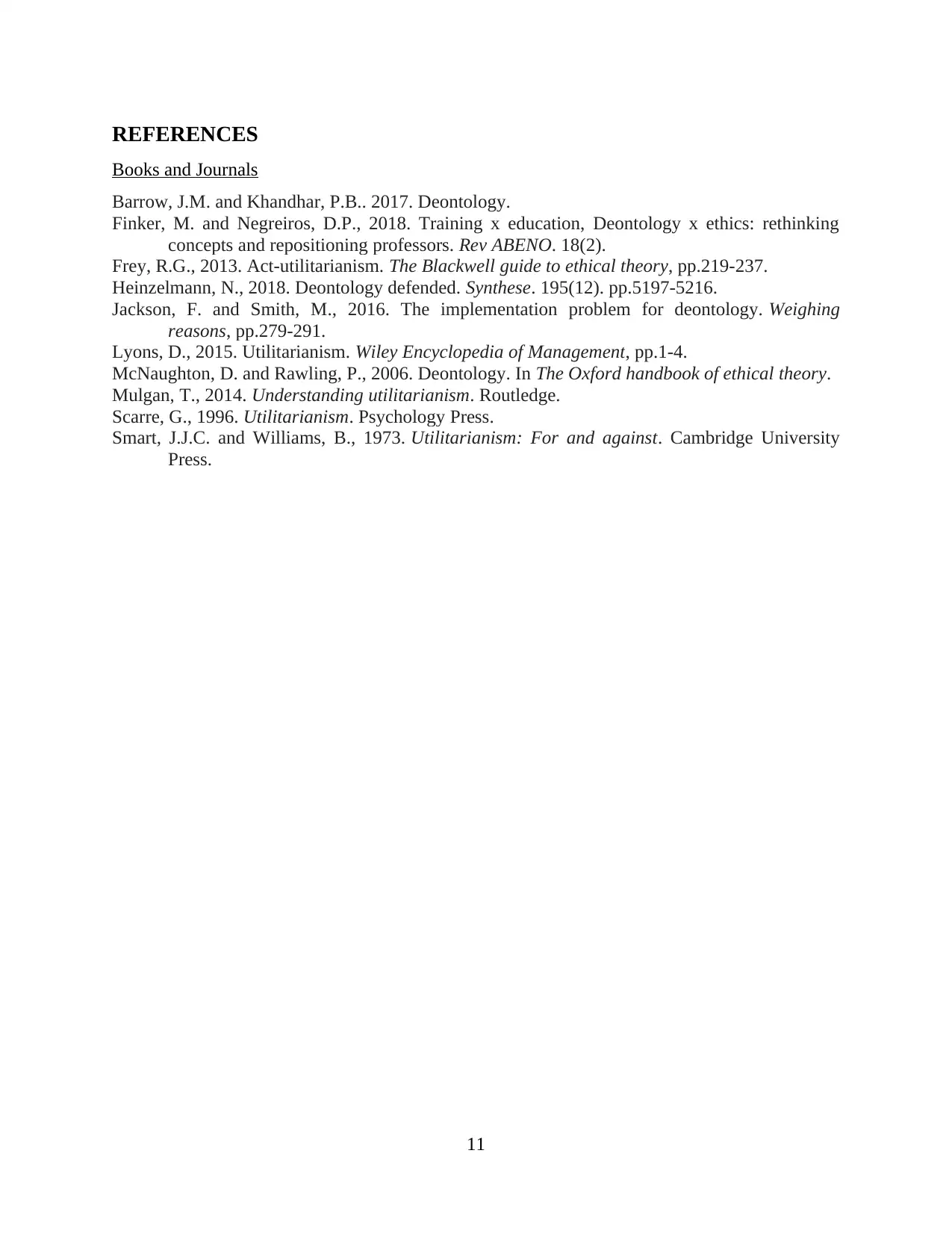
REFERENCES
Books and Journals
Barrow, J.M. and Khandhar, P.B.. 2017. Deontology.
Finker, M. and Negreiros, D.P., 2018. Training x education, Deontology x ethics: rethinking
concepts and repositioning professors. Rev ABENO. 18(2).
Frey, R.G., 2013. Act‐utilitarianism. The Blackwell guide to ethical theory, pp.219-237.
Heinzelmann, N., 2018. Deontology defended. Synthese. 195(12). pp.5197-5216.
Jackson, F. and Smith, M., 2016. The implementation problem for deontology. Weighing
reasons, pp.279-291.
Lyons, D., 2015. Utilitarianism. Wiley Encyclopedia of Management, pp.1-4.
McNaughton, D. and Rawling, P., 2006. Deontology. In The Oxford handbook of ethical theory.
Mulgan, T., 2014. Understanding utilitarianism. Routledge.
Scarre, G., 1996. Utilitarianism. Psychology Press.
Smart, J.J.C. and Williams, B., 1973. Utilitarianism: For and against. Cambridge University
Press.
11
Books and Journals
Barrow, J.M. and Khandhar, P.B.. 2017. Deontology.
Finker, M. and Negreiros, D.P., 2018. Training x education, Deontology x ethics: rethinking
concepts and repositioning professors. Rev ABENO. 18(2).
Frey, R.G., 2013. Act‐utilitarianism. The Blackwell guide to ethical theory, pp.219-237.
Heinzelmann, N., 2018. Deontology defended. Synthese. 195(12). pp.5197-5216.
Jackson, F. and Smith, M., 2016. The implementation problem for deontology. Weighing
reasons, pp.279-291.
Lyons, D., 2015. Utilitarianism. Wiley Encyclopedia of Management, pp.1-4.
McNaughton, D. and Rawling, P., 2006. Deontology. In The Oxford handbook of ethical theory.
Mulgan, T., 2014. Understanding utilitarianism. Routledge.
Scarre, G., 1996. Utilitarianism. Psychology Press.
Smart, J.J.C. and Williams, B., 1973. Utilitarianism: For and against. Cambridge University
Press.
11
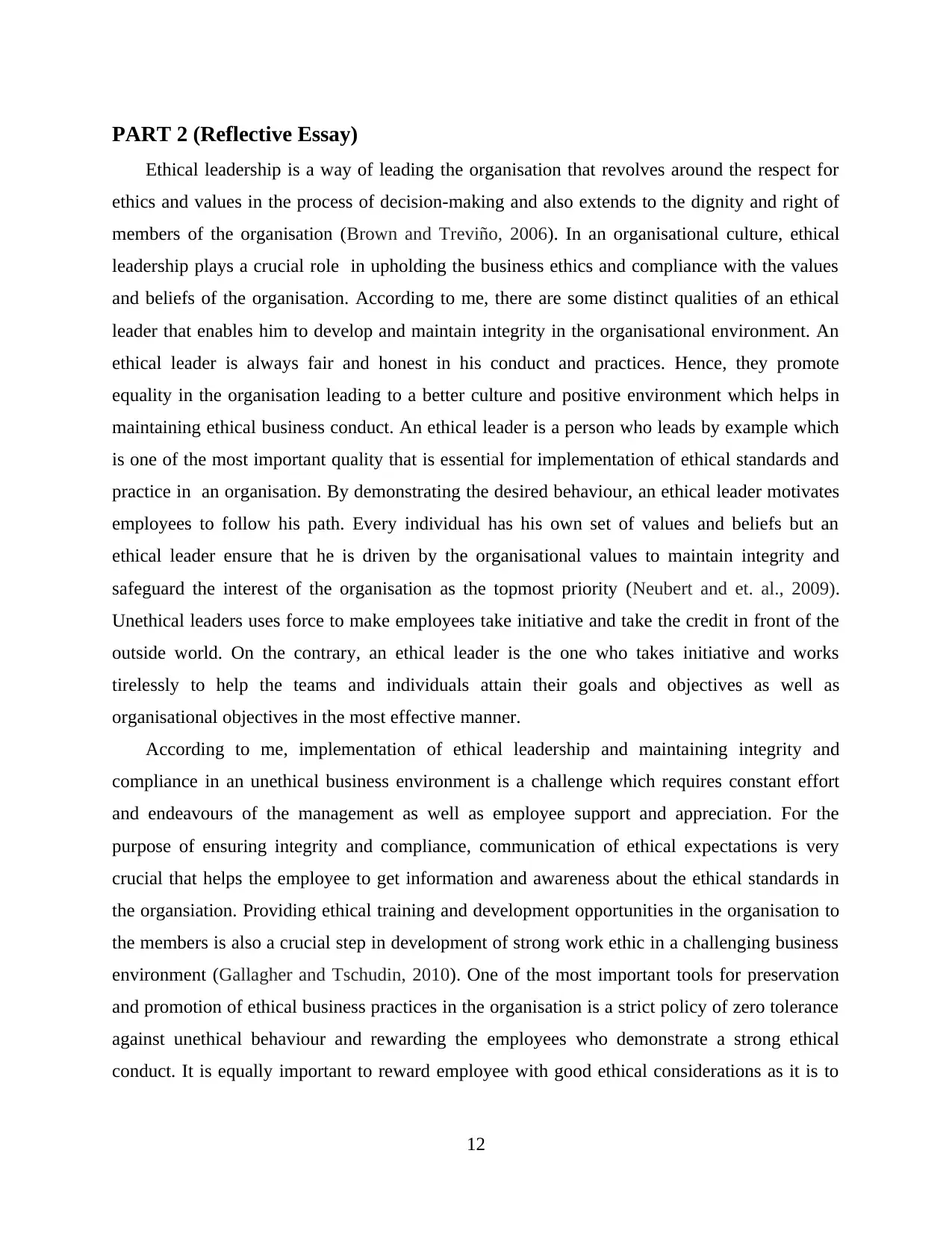
PART 2 (Reflective Essay)
Ethical leadership is a way of leading the organisation that revolves around the respect for
ethics and values in the process of decision-making and also extends to the dignity and right of
members of the organisation (Brown and Treviño, 2006). In an organisational culture, ethical
leadership plays a crucial role in upholding the business ethics and compliance with the values
and beliefs of the organisation. According to me, there are some distinct qualities of an ethical
leader that enables him to develop and maintain integrity in the organisational environment. An
ethical leader is always fair and honest in his conduct and practices. Hence, they promote
equality in the organisation leading to a better culture and positive environment which helps in
maintaining ethical business conduct. An ethical leader is a person who leads by example which
is one of the most important quality that is essential for implementation of ethical standards and
practice in an organisation. By demonstrating the desired behaviour, an ethical leader motivates
employees to follow his path. Every individual has his own set of values and beliefs but an
ethical leader ensure that he is driven by the organisational values to maintain integrity and
safeguard the interest of the organisation as the topmost priority (Neubert and et. al., 2009).
Unethical leaders uses force to make employees take initiative and take the credit in front of the
outside world. On the contrary, an ethical leader is the one who takes initiative and works
tirelessly to help the teams and individuals attain their goals and objectives as well as
organisational objectives in the most effective manner.
According to me, implementation of ethical leadership and maintaining integrity and
compliance in an unethical business environment is a challenge which requires constant effort
and endeavours of the management as well as employee support and appreciation. For the
purpose of ensuring integrity and compliance, communication of ethical expectations is very
crucial that helps the employee to get information and awareness about the ethical standards in
the organsiation. Providing ethical training and development opportunities in the organisation to
the members is also a crucial step in development of strong work ethic in a challenging business
environment (Gallagher and Tschudin, 2010). One of the most important tools for preservation
and promotion of ethical business practices in the organisation is a strict policy of zero tolerance
against unethical behaviour and rewarding the employees who demonstrate a strong ethical
conduct. It is equally important to reward employee with good ethical considerations as it is to
12
Ethical leadership is a way of leading the organisation that revolves around the respect for
ethics and values in the process of decision-making and also extends to the dignity and right of
members of the organisation (Brown and Treviño, 2006). In an organisational culture, ethical
leadership plays a crucial role in upholding the business ethics and compliance with the values
and beliefs of the organisation. According to me, there are some distinct qualities of an ethical
leader that enables him to develop and maintain integrity in the organisational environment. An
ethical leader is always fair and honest in his conduct and practices. Hence, they promote
equality in the organisation leading to a better culture and positive environment which helps in
maintaining ethical business conduct. An ethical leader is a person who leads by example which
is one of the most important quality that is essential for implementation of ethical standards and
practice in an organisation. By demonstrating the desired behaviour, an ethical leader motivates
employees to follow his path. Every individual has his own set of values and beliefs but an
ethical leader ensure that he is driven by the organisational values to maintain integrity and
safeguard the interest of the organisation as the topmost priority (Neubert and et. al., 2009).
Unethical leaders uses force to make employees take initiative and take the credit in front of the
outside world. On the contrary, an ethical leader is the one who takes initiative and works
tirelessly to help the teams and individuals attain their goals and objectives as well as
organisational objectives in the most effective manner.
According to me, implementation of ethical leadership and maintaining integrity and
compliance in an unethical business environment is a challenge which requires constant effort
and endeavours of the management as well as employee support and appreciation. For the
purpose of ensuring integrity and compliance, communication of ethical expectations is very
crucial that helps the employee to get information and awareness about the ethical standards in
the organsiation. Providing ethical training and development opportunities in the organisation to
the members is also a crucial step in development of strong work ethic in a challenging business
environment (Gallagher and Tschudin, 2010). One of the most important tools for preservation
and promotion of ethical business practices in the organisation is a strict policy of zero tolerance
against unethical behaviour and rewarding the employees who demonstrate a strong ethical
conduct. It is equally important to reward employee with good ethical considerations as it is to
12
⊘ This is a preview!⊘
Do you want full access?
Subscribe today to unlock all pages.

Trusted by 1+ million students worldwide
1 out of 14
Related Documents
Your All-in-One AI-Powered Toolkit for Academic Success.
+13062052269
info@desklib.com
Available 24*7 on WhatsApp / Email
![[object Object]](/_next/static/media/star-bottom.7253800d.svg)
Unlock your academic potential
Copyright © 2020–2026 A2Z Services. All Rights Reserved. Developed and managed by ZUCOL.





